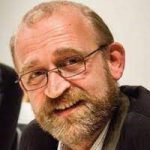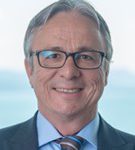Jean-Michel Rigo is a graduate in biology (1986), associate of upper secondary education (1987) and Doctor of Biomedical Sciences (1994). He is an active researcher in cellular neurophysiology and neurodevelopment (about a hundred publications in WoS). He teaches physiology to life science students (medicine, biomedical sciences, and biology).
Jean-Michel Rigo also has a long experience in teaching innovation (self-learning, e-learning, virtual labs), particularly in the field of standardized assessments: this goes back to the nineties when he contributed to the application to medical applications of a standardized and computerized assessment system which will later give birth to the DOCIMO platform.
At UHasselt, since 2010, he has coordinated collaboration with Assess Group S.A., then Itinera-Group S.A. for the use and improvement of the DOCIMO platform. This is currently used in bachelor’s degree courses in medicine and physiotherapy. In this context, he also provided training in quality control of evaluations at UHasselt, at the University of Hue (Vietnam), Kinshasa (UNIKIN, RDCongo), Kisangani (UNIKIS, RDCongo), and at the UMI (Morocco).
Since 2008, Jean-Michel Rigo has been involved in university development cooperation projects, in particular in DR Congo (UNIKIN and UNIKIS) and in Morocco (UMI), mainly focused on the strengthening of academic capacities in the field of education. (upgrading of bachelor’s level teaching, innovative teaching methods focused on the student and on the learning process, standardized assessments).
From 2012 to 2016, Jean-Michel Rigo was Vice-Rector for Education at UHasselt and since 2016 he has been Vice-Rector for Research. He has also been in charge of international relations since 2012. In the UHasselt strategic education plan, as approved by the UHasselt board in December 2015, the evaluation of learning and teaching are priority strategic objectives.
Talk title :
Evaluation of learning and teaching, CORETEV Erasmus+ project as example between past, present & future
Abstract :
Evaluation of learning – and of teaching – is at the core of the CORETEV Erasmus+ project (“CO-construction Nord-Sud d’un Reseau d’expertises pour l’utilisation des Nouvelles Technologies en EValutation des apprentissages et des enseignements”). We will present where this project originated, what are its challenges as well as the innovations it will bring with and how we see it evolving. This project is funded by the European Union in the frame of Erasmus+ KA2 – Capacity Building in the field of Higher Education and is coordinated by Hasselt University (Belgium).
The CORETEV project aims to modernize education systems by using evaluation to improve the quality of training. It is part of an innovative approach of co-construction and empowerment of HEIs in a North-South configuration.
The project responds to the priority needs in evaluation expressed by Moroccan universities and requires more and more the use of new technologies. It aims at creating 4 CEntres D’APpui à l’Evaluation (CEDAPE) in 4 Moroccan universities (UCD El Jadida, UCA Marrakech, UMI Meknes, AUI Ifrane). The CEDAPEs will interact within the iCEDAPE network, which will promote the sharing and contextualization of common tools as well as a dynamic transfer of North-South-South expertise in the fields of evaluation engineering and docimology.
The consortium includes 6 institutions, 4 from Morocco and 2 from the EU (Romania and Belgium). With the support of institutions from the North and experts in evaluation from the South (Bolivia, Mexico), the HEIs of the South will be actors in the modernization of their education systems thanks to 1) the transfer of North-South-South experience; 2) the creation of 4 CEDAPEs in Morocco; 3) the collaboration within the iCEDAPE network and 4) the support of 4 spin-offs to be created and which will deploy their activities there.
The CEDAPE teams will be autonomous in the use of their automatic data acquisition chain. They will have been trained on the platform for the construction and quality management of evaluations (DOCIMO) which will facilitate collaboration within iCEDAPE.
In terms of dissemination, a manual “Creating a CEDAPE” and a website that can be transposed to each CEDAPE will be developed. The expertise acquired, the creation of four spin-offs, the support of the iCEDAPE network, the empowerment and accountability of the teams, the support of the Ministry and the National Agency for Evaluation and Quality Assurance, and the quality of the contextualized services that meet the evaluation needs of Moroccan HEIs will ensure the project’s sustainability.
The three specific objectives (SO) of the project are :
- SO1: Modernize the evaluation system in 4 Moroccan universities (WP 1 to 4)
- SO2: To improve the quality of teaching and learning evaluations in a sustainable way (WP 2 to 5)
- OS3: Disseminate good practices of evaluation of teaching and learning through the iCEDAPE network (WP 3 and 7)
After having been a teacher and trainer of adult job seekers in the 1980s, Jean-Luc Gilles completed a master’s degree in psycho-pedagogical sciences and aggregation of upper secondary education for psycho-pedagogical sciences at the University of Mons (1992 ). Researcher at the Education Technology Service of the University of Liège (1992-1997) then doctoral assistant, he was in charge of the management of the Multimedia Interactive Self-Training and Assessment Center (CAFEIM, 1997-2000) and the Methodological System for Supporting Tests (SMART, 2000-2010). These experiences in the academic world allowed him to pursue a doctoral course in educational sciences in the field of evaluation engineering. From 2006 to 2010, he headed the General Teaching Department of the University of Liège. From 2010 to 2016, he was responsible for the Support Center for Research and International Relations at HEP Vaud. Among his fields of interest are also: the fight against dropping out of school through LASALÉ; the internationalization of teacher training with the PEERS it is setting up in 2011; Open Access through the ORFEE project.
Talk title :
Effective Assessments Processes in Higher Education: Perspectives Offered by the Application of Quality Cycles to the Evaluation Levels of Kirkpatrick’s Model and their Instrumentation Using Online Platforms
Abstract :
In our opinion, a quality approach in assessment development in higher education is inseparable from a reflection on assessment quality criteria. In this area, we were inspired by the recommendations contained in the Standards for Educational and Psychological Testing (AERA, APA, NCME, 1999). In order to put these reflections within the reach of field practitioners, we propose to meet quality criteria such as validity, reliability, sensitivity, diagnosticity, equity, practicability, communicability, authenticity, and acceptability (we will give a brief definition for each of them during this conference).
In addition to these criteria, it is also essential to define a step-by-step process with quality controls to create robust assessments. Given the issues and the amounts invested, training assessment methods in higher education must be of high quality and provide reliable results in order to improve education efficiency. In this area, we were influenced by Edward Deming’s work considered by many to be the father of the quality management movement. The way he envisions management processes improvement by adopting appropriate principles in order to increase quality and simultaneously reduce costs for organizations (by reducing waste, rework, staff attrition, etc.) was a source of inspiration for us. His key idea for a quality approach is to practice continual improvement and think of the processes as systems (Deming, 1986, 1993). This is what we have transposed to the field of higher education assessments construction within mind his famous quote “If you cannot describe what you are doing as a process, you do not know what you’re doing”. Another key idea we have taken up and adapted from Deming is that of the “Plan, Do, Check, Act” (PDCA) – he always referred to the “Shewhart cycle” – and in fact, at least partially, based on the scientific method (Best & Neuhauser, 2006).
During this conference, we will explain the quality cycle model we propose for higher education effective assessments that include the following steps: (1) Analysis of what we want to evaluate; (2) Design plan concerning how it will be evaluated ; (3) Elaboration of the questions / items / evaluation devices; (4) Training / Information of the people concerned by our evaluation system; (5) Conducting the assessment and collecting the data; (6) Correction, treatment and analysis of results; (7) Feedbacks to those involved in the evaluation and to stakeholders; (8) Regulation for continuous improvement of subsequent assessments. This kind of cyclic process includes quality control procedures. The idea is to provide an easy way to build effective assessments for practitioners who want to ensure a high level of quality in their evaluations at the four levels of Kirkpatrick’s model.
We will present this quality cycle approach applied to 3 of Kirkpatrick’s 4 levels of evaluation. We will show how we have applied this quality approach in the context of trainee satisfaction assessments (level 1) during their practical training at the University Hospital of Lausanne. We will also illustrate the application of the quality cycle in learning assessments (level 2) in the context of certification examinations carried out at the University of Teacher Education of State of Vaud in Switzerland. Finally, the use of the quality cycle for the evaluation of the transfer of learning (level 3) will be illustrated by applications in continuing education offered by the Training Center of the University Hospital of Lausanne.
Finally, we will show the facilities offered by certain functionalities of an online Assessment Management System (Docimo) that instruments the quality cycle applied to level 2. We will conclude by outlining the perspectives offered by an online platform yet to be built, which would allow the realization of assessment systems combining the quality cycles at the first three levels of Kirkpatrick’s model in order to contribute to the continuous improvement of the quality of learning and teaching in higher education.
 Short bio :
Short bio :Cédric Fluckiger is a University Professor, director of the Théodile-CIREL team at the University of Lille. He conducts research both in computer science didactics on school systems for training in digital and computer science, on the personal uses of children, adolescents, and students, and takes a didactic look at educational technology in primary, secondary, and university education.
Talk title :
Evaluating the uses of digital technologies at school: what perspectives for research and practitioners?
Abstract :
While digital technologies for teaching and learning seem to have become more widespread with the current health crisis, the question of evaluating uses and learning with technologies is raised with renewed acuity. Merchants praise the efficiency of their hardware and software products, and governments in different countries would like to justify the investments by showing that education is improved. For this, they often advocate for approaches stemming from evidence-based education. Practitioners both want insight into what works, but refuse to be seen as mere performers of methods and tools that are supposed to solve all problems. Research on educational technologies is thus caught in tension between the injunctions to expertise, or even the validation of digital tools, and the need for autonomy in scientific questions and methods. The conference intends to discuss, on the basis of current research, these tensions and the prospects then opened for research.
 Short bio :
Short bio :Abderrahmane LAHLOU is currently Founding Manager of ABWAB Consultants, specializing in Economics and Educational Management & Business Management, and Founding Director of the CIFIPE Teacher Training and Development Center. From 1993 to June 2011 he headed Mundiapolis University and Al Madina Schools, of which he was the founding President. He was a Member of the National Employers Council of the CGEM and Vice-President of the Teaching Federation between 1998 and 2003. He was Founding President of the ABCF (Association of Consulting and Training Offices, and Founding President l ‘Association de l’Enseignement Général Privé (AMEPEGE). At the same time, he was Chairman of the Board of a Textile company and has until now carried out activities of Administrator in Industry, Banking, Consulting, and financial services. His last degree obtained was a Doctorate in Management from Pierre Mendès France University in Grenoble, in 1986 (New French Regime, PhD equivalent). He holds the Certificate of Strategic Management from HEC Paris. At the same time, he is an international teacher and lecturer, author of two books on the education system, educational columnist in L’Economiste, in addition to numerous associative responsibilities. He is fluent in Arabic, French, and English.
Talk title :
Constructive alignment: Objectives- Teaching- Assessment’
Abstract :





